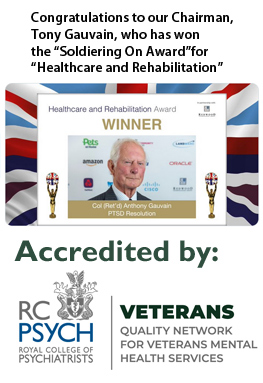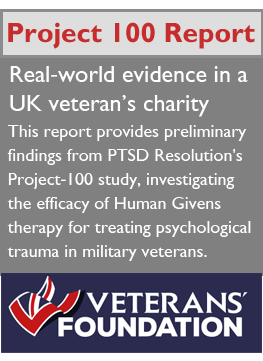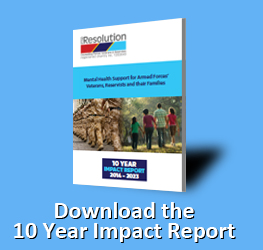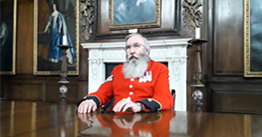Conference 2019

|
The PTSD RESOLUTION 10TH ANNIVERSARY CONFERENCE 18th MAY 2019
|
|
A highly successful PTSD Resolution conference marked the 10th anniversary of the charity and was attended by HG (Human Givens) therapists, as well as forces’ veterans and family members who have received treatment successfully for mental health issues. The conference is for the 200 Human Givens therapists, as part of their continuous professional development, and is also open to other healthcare and military professionals with an interest in military mental health. The programme included the launch of a new video ‘Drop the Mask’, an update on the evidence of the 2,300 results to date; briefings with case studies on ‘complex’ PTSD, medication and nutrition; briefing on a therapist’s new book ‘PTSD: Understanding and Recovery’; introduction of an App ‘Better Stop Suicide’; and the results of a ten year online survey, and the launch of a new survey about the patient’s journey.
Bill Andrews, developer of Pragmatic Tracker said: “Just to say a huge thanks to everybody for making this such a memorable conference, rich in so many ways. For me the outstanding feature was the presence and contribution of so many clients. Their courage to come forward and to manage the delivery of so much harrowing content was extraordinary. “I've been to many psychotherapy conferences and the one person who's always missing is the client. Here the client was front and centre. What also really struck me was what a difficult area we work in, with all the confounding complexity of the appalling situation with over prescription of medication and the constant profusion of misinformation about nutrition. Yet, with all of this, there are so many success stories for PTSD Resolution who help restore lives to these incredible people up and down the country.” Conference Guest Speakers Bill Andrews: he developed Pragmatic Tracker - a software programme to collate outcomes and to make the process of working with client feedback as easy as possible - with his colleague, Tony Jordan. He's a senior associate with the International Centre for Clinical Excellence and has published and presented on outcome informed practice. Bill used his time at the conference to review the patterns in PTSD Resolution data, to show exciting new developments coming along in Pragmatic Tracker, and to highlight simple ways therapists can make the obtaining of measures much easier for themselves. Jenny Edwards: while working with clients she became aware that some had more complex forms of trauma than others and this set her off to discover why this is so and how Human Givens therapy can be adapted to work effectively with these kinds of trauma. Her talk looked at how common is complex trauma amongst veterans and their families, what contributes to a person having a complex form of trauma and how we can use Human Givens along with Stephen Porge’s Polyvagal Theory to work effectively with veterans and their families. Rob Parkinson: he has been a professional storyteller and musician for the last 35 years, visiting many thousands of schools, libraries, arts centres and theatres throughout the UK and on four continents. Since 2001, he has combined this with work as a freelance Human Givens therapist and currently has a private practice in Tonbridge, Kent. He is the author of several titles, including Transforming Tales (How Stories can Change People) and has run many training courses on storytelling for therapists, educators and other professionals. Rob has worked with many cases of PTSD in veterans, emergency response workers and in the general public - and indeed in too many of the teenagers at a secondary academy he visits on a ‘difficult’ Medway estate. Rob focused on the challenges of a recent case of complex PTSD, who gave a moving account of his experiences. Marion Brown: she had been following Human Givens for a number of years before qualifying as a Human Givens therapist in 2011. In the course of her therapy work she became extremely concerned to learn of the bewildering (and sometimes very frightening) problems being experienced by people due to antidepressants – and other meds – ‘taken as prescribed’. This led her to explore in depth what is going on – and she talked about this in the context of PTSD Resolution’s work with veterans. This session included essential insights, understanding, information and further resources to draw on when working with medicated clients. Mary Strugar: she is passionate about the interface between Orthodox Medicine and supportive nutritional and psychotherapy interventions helping people on their paths to recovery. She works with GPs and Consultant Doctors at the Hospital of St John and St Elizabeth, St John’s Wood, London as well as a West London Clinic and her practice in Surrey. This session included training on nutrition and also introduced two of Mary’s PTSD Resolution clients, both of whom as well as receiving psychotherapy support also incorporated some nutrition and lifestyle changes within their recovery. They both represent ‘work in progress’ and this session gave some insight into their journeys. Hannah Jackson: she worked as an actor and singer and ran her own theatre company specialising in period theatre, music and dance. She performed at many period theatre spaces including The Globe, Lincoln’s Inn and Hampton Court. She is an experienced business role-player, facilitator and trainer. As a Human Givens psychotherapist she sees clients in her private practice in central London and continues to work in business and education She co-runs Yellow Tree Wellbeing which provides training, coaching and away days and retreats for workplace wellbeing. She presented two of her Veteran clients, who each told of their experiences and benefit of their treatments. John Halker: he is a Human Givens psychotherapist, writer and broadcaster with a particular interest in helping people overcome the effects of trauma. John is also the co-founder of The Better App Company, a Guernsey-based organisation offering the very latest innovation in technology and design to the world of mental and emotional health. He gave a brief presentation of his recently launched app – Better Stop Suicide.
|





